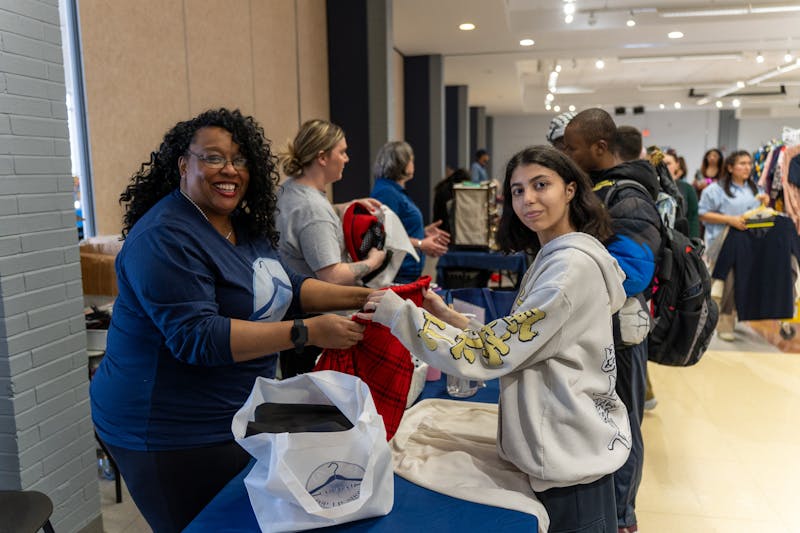Christine Thorpe, Ph.D., the dean of the Nathan Weiss Graduate College, presented for the Annual Women's History Month Lecture on Friday, March 1. Her topic, titled "Free from Slavery, Bound by Historical Traumas: The Economic Bondage of Chronic Health Issues Among African American and Native American Women", sparked insightful conversations among the audience.

The event was co-hosted by the College of Liberal Arts, Women's and Gender Studies Program and the Center for Interdisciplinary Studies (CIS). To begin, Thorpe explained that the inspiration for the topic of conversation came about as she was doing her dissertation as a doctorate student, where she studied the health practices of African American women. She then continued to dive into the subject by looking into health disparities of communities of color, eventually becoming an expert through years of study on the subject she was to present.
From the beginning of her lecture, Thorpe invited students to share whatever knowledge they had learned about African American and Native American women, opening up the floor for a presentation that encouraged audience participation. After the initial discussion, Thorpe then proceeded to go through a timeline beginning at the arrival of Columbus in 1492 and onward, driving home key points that would give context to the rest of her lecture. Each date within the timeline was a time in American history that exemplified ways African American and Native American women's humanity and dignity were diminished and endangered. She marked the beginning of this practice for her lecture as 1619 with the start of chattel slavery. Thorpe explained that chattel slavery is the practice of perceiving humans as property, whereas slavery implied servitude like that of a willing indentured servant. Thorpe noted that chattel slavery led to African Americans and Native Americans to be used as currency and tools to progress the wants of those in power.

Thorpe went on to explain other key points in American history in which African American and Native American women were marginalized through a variety of practices. She discussed the Indian Removal Act of 1830, Carlisle Indian Industrial School in 1879, Henrietta Lacks in 1951, coerced sterilization in the 1970's and more, which exemplified the struggles African American and Native American women have endured in their constant fight for public health care.
Thorpe explained that this long history of women's struggles was also created as a result of the internal colonial practices of America. As discussed by Thorpe, internal colonialism is the practice of the colonizer not only colonizing a group of people, but also inhabiting that land. This forces the indigenous people to conform to the new expectations of the conqueror, marking demarcations between the colonized and colonizer.
An example of this was the power struggle discussed by Thorpe between European patriarchy and Native American egalitarianism, in which the European men had a difficult time accepting that women were esteemed and held positions of power within Native American tribes. This posed a challenge between the two groups and affected the way Native American societies were perceived and negotiated with by the European societies. Thorpe explained that this discrepancy led to the forced redistribution of power by the Europeans onto the Native American peoples in an effort to keep women marginalized. The Europeans did this often by separating mother from child, impeding the spread of their culture. As a result, the Native American communities lost huge parts of their culture that had traditionally been passed down maternally. Thorpe connected this to the similar practices of uprooting African American slaves from their mothers and home countries.
Thorpe explained that all bodies were seen as commodities to be used for economic benefit within the practice of chattel slavery. Thorpe concluded that slavery was a huge business, which was why the Civil War of 1861 through 1865 had been so intense.
As a result of the years of oppression African American and Native Americans suffered, Thorpe suggested that these communities are now experiencing and coping with historical trauma. Historical trauma refers to the cycle of emotional stress experienced by a community of people and passed down between generations resulting from a traumatic event the community experienced such as persecution, genocide, enslavement and more. As a result, members of a community may suffer post-traumatic stress disorder (PTSD), depression, suicidal ideation, substance abuse and other health problems according to Thorpe.
Within Thorpe's studies she has found that there is a huge discrepancy in public health practices and attainment for African American and Native American women. Thorpe then proceeded to disclose statistics on health issues that affect these communities and suggested that these health issues may be supported systematically against the communities. She opened this topic up for discussion toward the audience who had a lot to say about personal observations that evidenced such systematic racism.
Thorpe then concluded her presentation with a call to action. She asserted that everyone in the audience who had heard her lecture should take steps to advocate for others who may be oppressed,and to empower and educate other women on the choices available to them for the betterment of themselves and their families. These choices may include becoming educated on proper public health practices or joining support groups. Nonetheless, Thorpe believes people must all support each other in order to bring about positive change within the society.







